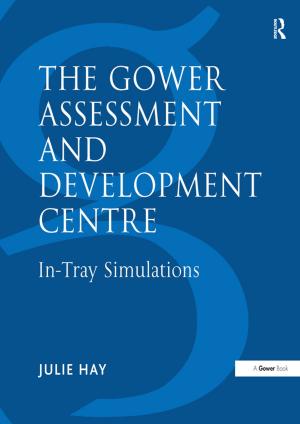Fabricating Quality in Education
Data and Governance in Europe
Nonfiction, Reference & Language, Education & Teaching, Educational Theory, Educational Reform| Author: | ISBN: | 9781136824463 | |
| Publisher: | Taylor and Francis | Publication: | December 22, 2011 |
| Imprint: | Routledge | Language: | English |
| Author: | |
| ISBN: | 9781136824463 |
| Publisher: | Taylor and Francis |
| Publication: | December 22, 2011 |
| Imprint: | Routledge |
| Language: | English |
How is European Education Governed?
Data is now the lifeblood of education governance. At the international level, organisations like the OECD steer education systems through their programmes of assessment and the European Commission’s project of creating the most successful knowledge economy in the world is driven by data collection, analysis and comparison. At the national level, policy-makers increasingly depend on data to show them where they are positioned, in relation to their competitors, and draw on data to justify policy directions. Within systems, schools and teachers have become proficient in data use, and interpret their priorities with reference to data.
This book draws on a three-year comparative study of the influence of data on education systems in Europe, looking at the contrasting policy contexts of Denmark, England, Finland, Scotland and Sweden, and examining the use of data in these systems, in relation to steering by Europe, as well as policy mediation and ‘translation’ of data within systems. The authors draw on interviews with key policy actors in the European Commission and with national policy makers in all five systems, as well as on local case studies and a major comparative survey of the effects of data production and use on the work of teachers and headteachers. The research brought together international researchers from a variety of disciplinary backgrounds, including educationalists, political scientists and specialists in research and evaluation.
The book offers new arguments relating to the use of Quality Assurance and Evaluation as a means of standardising and harmonising education policy and practice, while also drawing attention to significant variation in policy and practice across these systems. It should be of interest to researchers, post-graduate students and advanced undergraduate students in policy studies in education and more generally.
How is European Education Governed?
Data is now the lifeblood of education governance. At the international level, organisations like the OECD steer education systems through their programmes of assessment and the European Commission’s project of creating the most successful knowledge economy in the world is driven by data collection, analysis and comparison. At the national level, policy-makers increasingly depend on data to show them where they are positioned, in relation to their competitors, and draw on data to justify policy directions. Within systems, schools and teachers have become proficient in data use, and interpret their priorities with reference to data.
This book draws on a three-year comparative study of the influence of data on education systems in Europe, looking at the contrasting policy contexts of Denmark, England, Finland, Scotland and Sweden, and examining the use of data in these systems, in relation to steering by Europe, as well as policy mediation and ‘translation’ of data within systems. The authors draw on interviews with key policy actors in the European Commission and with national policy makers in all five systems, as well as on local case studies and a major comparative survey of the effects of data production and use on the work of teachers and headteachers. The research brought together international researchers from a variety of disciplinary backgrounds, including educationalists, political scientists and specialists in research and evaluation.
The book offers new arguments relating to the use of Quality Assurance and Evaluation as a means of standardising and harmonising education policy and practice, while also drawing attention to significant variation in policy and practice across these systems. It should be of interest to researchers, post-graduate students and advanced undergraduate students in policy studies in education and more generally.















